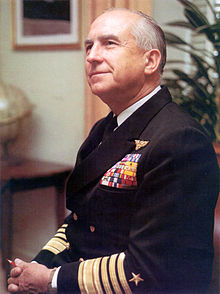Thomas Hinman Moorer
| Thomas Hinman Moorer | |
|---|---|

Admiral Thomas H. Moorer, U.S. Navy
|
|
| Born |
February 9, 1912 Mount Willing, Alabama, U.S. |
| Died | February 5, 2004 (aged 91) Bethesda, Maryland, U.S. |
| Buried at | Arlington National Cemetery |
| Allegiance |
|
| Service/branch |
|
| Years of service | 1933–1974 |
| Rank |
|
| Commands held |
Chief of Naval Operations Chairman of the Joint Chiefs of Staff |
| Battles/wars |
World War II Vietnam War |
| Awards |
Defense Distinguished Service Medal (2) Navy Distinguished Service Medal (5) Silver Star Legion of Merit Distinguished Flying Cross Gray Eagle Award |
|
|
Thomas Hinman Moorer (February 9, 1912 – February 5, 2004) was an admiral and naval aviator in the United States Navy who served as Chief of Naval Operations from 1967 to 1970, and as the Chairman of the Joint Chiefs of Staff from 1970 to 1974.
Moorer was born in Mount Willing, Alabama on February 9, 1912. His father, a dentist, named his son for his favorite professor at Atlanta-Southern Dental College, Dr. Thomas Hinman. Moorer was raised in Eufaula, Alabama.
Moorer graduated from the United States Naval Academy on June 1, 1933 and was commissioned an ensign. After completing Naval Aviation training at the Pensacola Naval Air Station in 1936, he flew with fighter squadrons based on the aircraft carriers USS Langley, USS Lexington and USS Enterprise.
In addition to his carrier-based fighter experience, Moorer also qualified in seaplanes and flew with a patrol squadron in the early years of World War II. Serving with Patrol Squadron Twenty-Two at Pearl Harbor, Hawaii, when the Japanese Empire attacked on December 7, 1941, his squadron subsequently participated in the 1941-42 Dutch East Indies Campaign in the southwest Pacific, where he flew numerous combat missions. Moorer received a Purple Heart after being shot down and wounded off the coast of Australia on 19 February 1942 and then surviving an attack on the rescue ship, Florence D., which was bombed and sunk the same day by enemy aircraft involved in the first Bombing of Darwin. Moorer also received the Distinguished Flying Cross for his valor three months later when he braved Japanese air superiority to fly supplies into, and evacuate wounded out of the island of Timor.
...
Wikipedia
